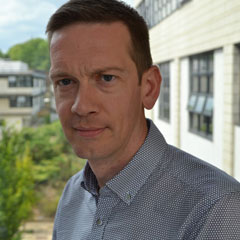Peter Coventry, Senior Lecturer, Department of Health Sciences and York Environmental Sustainability Institute (YESI)
Peter is a senior lecturer in health services research with the Mental Health and Addiction Research Group (MHARG).

He also co-leads the 'Environment and Health' research theme within the York Environmental Sustainability Institute (YESI). Peter studied sociology at the University of Leicester and completed a PhD in medical sociology at the University of Manchester.
He then trained in applied health sciences at the School of Health and Related Research at the University of Sheffield.
email: peter.coventry@york.ac.uk
Our 60-second interview with Peter:
What do you do in the field of mental health?
My research as a health scientist focuses on evaluating the mental health benefits of engaging with nature-based interventions (e.g. conservation, horticultural therapy) and more broadly, I work across projects that aim to understand that association between exposures to natural environments, eg green and blue space, and mental health and wellbeing. I also co-lead the Environment and Health research theme at the York Environmental Sustainability Institute (YESI).
What do you find most rewarding and inspiring in this work?
Much of the work I do on the relationship between natural environments and health and wellbeing is truly interdisciplinary and I really value the chance to collaborate with colleagues across different branches of science, social sciences, and the humanities too. I’m somewhat of a researcher nomad and have always enjoyed moving between disciplinary boundaries and learning new ways to tackle problems and research questions.
What is the most challenging or complicated aspect of this work?
While the interdisciplinary nature of my research is very rewarding, it is also a challenge to be able to communicate with colleagues who work in different ways and have a different academic heritage. It takes time and patience on everyone’s part to make these kinds of collaborations work.
What impact do you hope your work is having- or can potentially have?
I hope my research can strengthen the evidence base for why engagement with nature can be beneficial for mental health and wellbeing and that this evidence can translate into policy decisions about improving access to things like green space, especially for disadvantaged populations at risk of mental health problems.
Could you share with us one piece of advice that you follow for your own mental health?
I struggle like a lot of academics to find a work-life balance, but spending time outdoors is essential for my mental health, free from phones and other distractions. A woodland or beach walk every now and again is a great way to reset and find the energy to keep going at work.